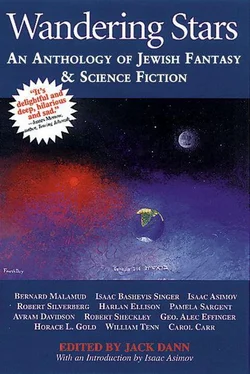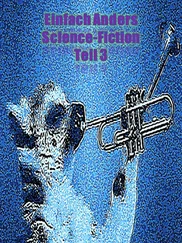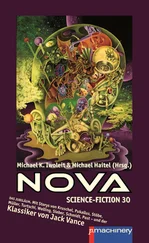Meanwhile delegates to the Conference are on their way from all over the galaxy. If they can’t land on Earth, where do they go? And to what site should the Conference be transferred by the authorities?
Where else but to Venus? It’s the perfect place for such a conference. The scenery is gorgeous—on the other side of the dust storms—and there’s a Viceroy whose administration loves the Jewish people most dearly. Besides, there’s a desperate housing shortage on Venus. That will create the kind of problem Jews love to solve: a game of musical burrows.
Listen, it could have been worse. As Esther said to Mordecai when he told her of Haman’s plans to massacre all the Jews of Persia—it could have been worse, but I don’t for the moment see exactly how.
So the delegates begin arriving in the Solar System, they’re shunted to Venus—and don’t ask. Life becomes full of love and bounce for us all. First, a decree comes down. The delegates can’t use hotel facilities on Venus, even if they’ve got the money: there are too many of them, they’ll put a strain on the hotel system or something. Next, the Jews of Venus are responsible for their coreligionists. In other words, not only is a Jew naturally a brother to every other Jew, he’s now also got to be either a boarder or a landlord.
Stop for a moment and reflect on how many are inflicted on us. Each and every planet in the galaxy which has a human population has at least a breath, a kiss, of Jewish population. So from this planet comes two delegates, from that one fifteen delegates, from that other one—where there are plenty of Jews, they should live and be healthy, but they disagree with each other; comes a total of sixty-three delegates, organized in eight separate caucuses. It may not be nice to number Jews, even if they’re delegates, but you can figure for yourself that by the time the last one has landed at a Venusian spaceport, we’ve got more than enough to go around.
We’ve got plenty. And on Venus, you don’t go up on the surface and throw together a couple of shacks for the visitors.
The Williamsburg Ashkenazim object. To them, some of these Jews aren’t even Jews; they won’t let them into their burrows, let alone their homes. After all, Shomrim in khaki pants whose idea of a religious service is to stand around singing Techezachna , Reconstructionists who pray from a siddur that is rewritten every Monday and Wednesday, Japanese Hasidim who put on tefillin once a year at sunset in memory of the Great Conversion of 2112—these are also Jews, say the Williamsburg Ashkenazim?
Exactly, these are also Jews, say the government officials of Venus. Brothers and boarders they are, and you will kindly make room for them. And they send in police, and they send in troops. Heads are cracked, beards are torn, life, as I said, is full of love and bounce.
And if you don’t object, you think it helps? Sure it helps—like a groan it helps. The Levittown Ashkenazim announce we’ll cooperate with the government, we’ll provide housing for the delegates to the limit—beyond the limit, even. So what happens? My brother and his family and all their neighbors get evicted from the Kwantung Burrow, it’s needed for delegate headquarters says the government.
An Interstellar Neozionist Congress we had to have?
I look around and I remember the promise made to Abraham, Isaac, and Israel—“I will multiply your seed as the stars of heaven”—and I think to myself, “A promise is a promise, but even a promise can go too far. The stars by themselves are more than enough, but when each star has maybe ten, twenty planets…”
By this time, me and my whole family, we’re living in what used to be the kitchen of our apartment. My brother and his family, it’s a big family, they should live and be well, they’re living in the dining room. In what my wife, Sylvia, calls the parlor, there’s the wonder-working rabbi from Procyon XII and his entire court—plus, in one corner of the parlor, there’s the correspondent from the Jewish Sentinel of Melbourne, Australia, and his wife, and their dog, an Afghan. In the bedrooms—listen, why should I go on? In the bedrooms, there are crowds and arguments and cooking smells that I don’t even want to know about.
Enough already? No, I am sorry to tell you, not enough.
One day I go into the bathroom. A man is entitled once in a while to go into the bathroom of his own apartment? It’s nature, no? And there in the bathtub I see three creatures, each as long as my arm and as thick as my head. They look like three brown pillows, all wrinkled and twisted, with some big gray spots on this side and on that side, and out of each gray spot there is growing a short gray tentacle. I didn’t know what they were, giant cockroaches maybe, or some kind of plant that the delegates living with us brought along as food, but when they moved I let out a yell.
My son, Aaron David, came running into the bathroom. “What’s the matter, Papa?”
I pointed to the brown pillows. They had some sort of ladder arrangement set up in the bathtub with small shelves in different places, and they were climbing up and down, up and down. “What’s the matter, you want to know, when I see things like that in my bathroom?”
“Oh, them. They’re the Bulbas.”
“Bulbas?”
“Three of the delegates from the fourth planet of the star Rigel. The other three delegates are down the corridor in the Guttenplans’ bathroom.”
“Delegates? You mean they’re Jewish?” I stared at them. “They don’t look Jewish.”
Aaron David rolled his eyes up to the ceiling of the bathroom. “Papa you’re so old-fashioned! You yourself told me that the blue Jews from Aldebaran show how adaptable our people are.”
“You should pardon me,” I said. “You and your adaptable. A Jew can be blue—I don’t say I like it, but who am I to argue with somebody else’s color scheme?—and a Jew can be tall or short. He can even be deaf from birth like those Jews from Canopus, Sirius, wherever they come from. But a Jew has to have arms and legs. He has to have a face with eyes, a nose, a mouth. It seems to me that’s not too much to ask.”
“So their mouths are not exactly like our mouths,” Aaron David said excitedly. “Is that a crime? Is that any reason to show prejudice?”
I left him and I went to the bathroom in the synagogue. Call me old-fashioned, all right, but there are still boundaries, there are certain places where I have to stop. Here, I have to say, Milchik cannot force himself to be modern.
Well. You know what happened. It turns out I’m not the only one.
I took the day off and went to the first session of the Conference. “Rich man,” my Sylvia says to me. “My breadwinner. Family provider. From political conferences you’re going to get brides for your three sons?”
“Sylvia,” I say to her. “Once in a lifetime my customers can maybe not have clear reception of the news broadcasts and Captain Iliad. Once in a lifetime I can go see representatives from all of the Jews of the Galaxy holding a meeting and getting along with each other.”
So I went. Only I can’t say they got along so good. First there was the demonstration by the Association of Latter-Day Mea Shearim (“If the Messiah appears and starts going from star to star, only to find that all Jews are already on Earth and in Israel…”). When that was quieted down, there was the usual Bronsteinite Trotskyist resolution aimed at the Union of Soviet Uganda and Rhodesia, followed by the usual attempt to excommunicate retroactively the authors of the Simplified Babylonian Talmud that had been published in 2685. Then we had to sit through an hour of discussion about how the very existence of a six-story-high statue of Juan Crevea in Buenos Aires was an affront and an insult and an agony to every Jew, and how we should all boycott Argentinian products until the statue was pulled down. I agreed with what the chairman said when he managed to rule the discussion out of order: “We cannot allow ourselves to be distracted by such ancient agonies, such stale affronts. If we do, where do we begin and where do we stop? Let Argentina have its statue of Crevea, let Düsseldorf have its Adolf Hitler University, let Egypt and Libya continue to maintain the Torquemada Observatory on Pluto. This is not our business here today.”
Читать дальше












